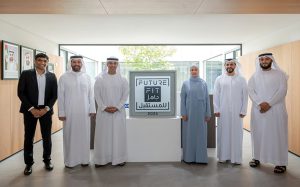DUBAI / WAM
The UAE Space Agency is awarded the “Future Fit” Seal for its flagship Space Data Centre—an innovative national initiative that is revolutionising digital infrastructure to support the UAE’s space
ambitions. This recognition is granted by the UAE Government Development and the Future Office to federal and local government projects, which enhances the UAE’s readiness for the future. These projects are recognised for their proactiveness and exceptional readiness to navigate future challenges and opportunities with bold and practical future visions.
The Space Data Centre plays a crucial role in accelerating digital transformation and harnessing space technologies and AI to serve humanity and sustainability. Through a partnership with Space42, the UAE-based AI-powered SpaceTech company, the first centre of its kind in the region has been developed and operated to provide commercial space services supported by artificial intelligence (GIQ.AE). It offers advanced services including access to Earth observation data, AI-powered analytics, and a marketplace for space applications.
It hosts 47 internally developed AI models, which are used to analyse satellite data for critical tasks such as environmental change detection, ship tracking, and disaster management, including floods and earthquakes.
Leveraging an integrated infrastructure connected to a global network of over 300 Earth observation satellites, the centre contributed to more than 30 national and international space missions.
Ohood bint Khalfan Al Roumi, Minister of State for Government Development and the Future, stated that the UAE’s wise leadership is committed to catalysing digital transformation and adopting innovative technological solutions across all sectors, while enabling the UAE’s global leadership and competitiveness. Al Roumi noted that the Space Data Centre reflects the UAE’s future-oriented vision and the strategic importance of the space sector in shaping a sustainable, human-centred society. She described the project as a global reference in the use of space science to support national planning through smart KPIs that enhance resilience and accelerate responsiveness to future change.
Dr. Ahmad Belhoul Al Falasi, Minister of Sport and Chairman of the UAE Space Agency, described the centre as a strategic milestone in the UAE’s path towards developing a cutting-edge space economy. He said it represents an advanced digital infrastructure unlike any other in the region, providing centralised access to space data for researchers,
scientists, government institutions, private sector businesses, startups, and the wider community.
The centre further supports the UAE’s innovative ecosystem by offering an integrated environment that promotes scientific research and accelerates the development of space-based applications addressing global challenges such as climate change, food security, and natural resource management. “This project empowers entrepreneurs and startups while nurturing talented and creative minds and promoting the UAE’s position as a trusted regional hub for space science and technology. The initiative reflects the directives of the UAE’s leadership, ensuring the sustainability and advancement of the national space sector and supporting the achievement of comprehensive sustainable development goals in the decades ahead,” he added. Since its launch in 2022, the Space Data Centre has delivered more than 30 real-world success stories that have directly supported decision-making across critical sectors both locally and internationally. These include enhancing emergency response efforts during the earthquakes in Turkey and Morocco, building an early warning system to protect coral reefs in the Maldives, and developing the “Nabat” space-based application to improve food security through AI-empowered analysis of over 4,000 local farms, enabling precise monitoring of methane emissions to support climate goals. The centre is also a key contributor to international disaster relief efforts through its participation in the International Charter on Space and Major Disasters, where the UAE remains the only Arab member state. The UAE has launched strategic partnerships with local and global space agencies, reflecting its commitment to supporting humanitarian and scientific efforts worldwide.
The centre serves as a cornerstone in developing national capabilities in remote sensing, further enhancing the UAE’s role in supporting international efforts to address global disasters. The centre’s architecture is designed with the future in mind. It relies on a unified infrastructure capable of integrating and analysing data from multiple sources efficiently. It employs AI-driven predictive analytics and supports real-time data analysis through dynamic workflows that adapt to evolving priorities. This design enables rapid and coordinated response to crises and disasters. The centre also promotes digital sustainability through an open, collaborative ecosystem that facilitates access to data and AI models while optimising resource use. Furthermore, it moves toward intelligent automation in space data management and marks a significant step forward in operational efficiency.
The importance of the Space Data Centre is underscored by the rapid global expansion of the space data economy, which is projected to generate up to $700 billion in added value by 2030 and contribute as much as $3.8 trillion to global GDP between 2023 and 2030.
As part of its strategic outlook, the UAE Space Agency is driving various key satellite programs, including the Arab Satellite 813—the UAE’s first hyperspectral satellite developed to strengthen ties among Arab Space Cooperation Group—and the national “Sirb” radar satellite constellation, which delivers high-resolution imaging around the clock and in all weather conditions.
The centre also houses valuable datasets from the Emirates Mars Mission, known as the Hope Probe. These projects serve as a strategic pillar for the space data centre, contributing to the expansion of its coverage and the quality enhancement of its outputs.
 The Gulf Time Newspaper One of the finest business newspapers in the UAE brought to you by our professional writers and editors.
The Gulf Time Newspaper One of the finest business newspapers in the UAE brought to you by our professional writers and editors.
